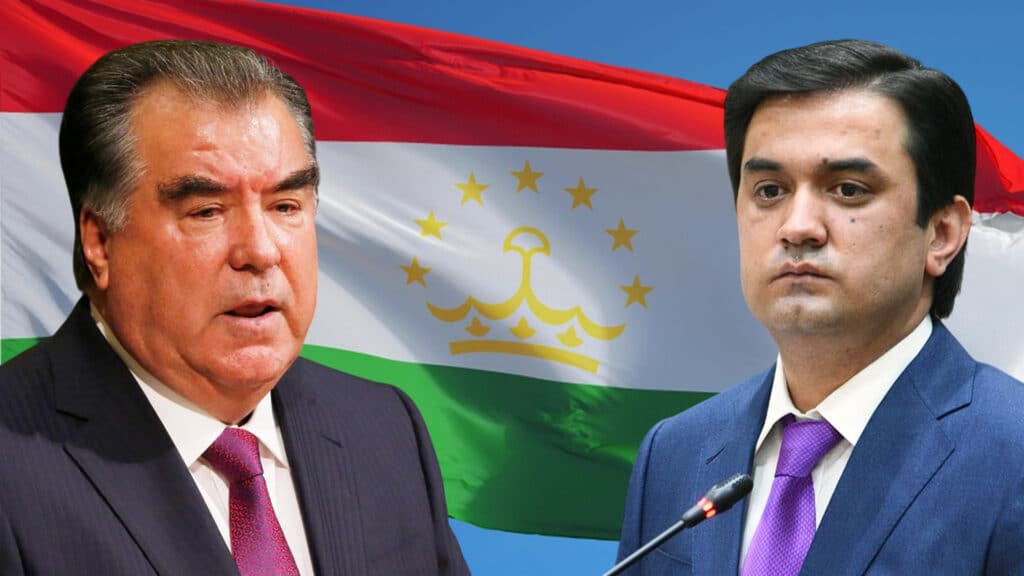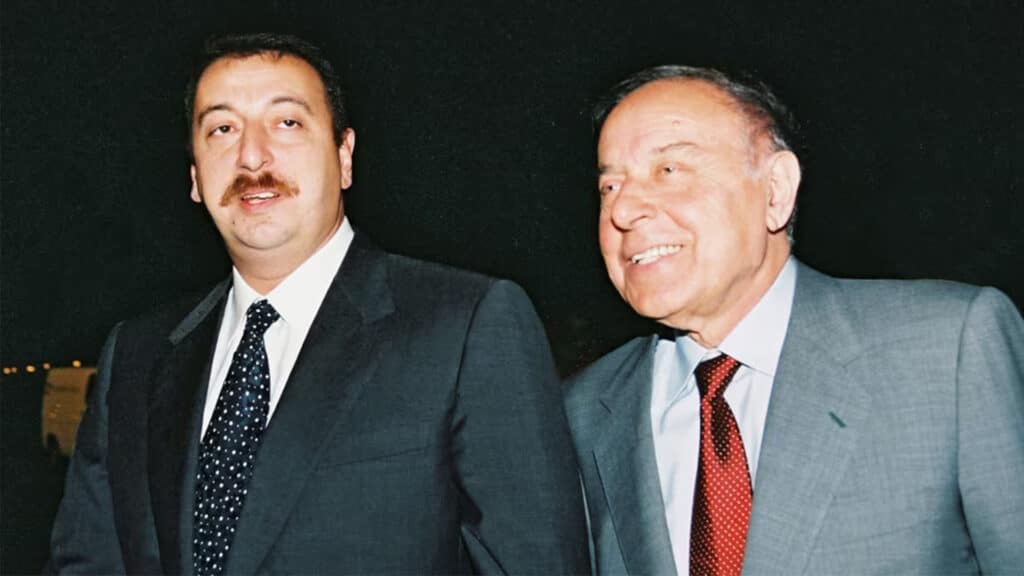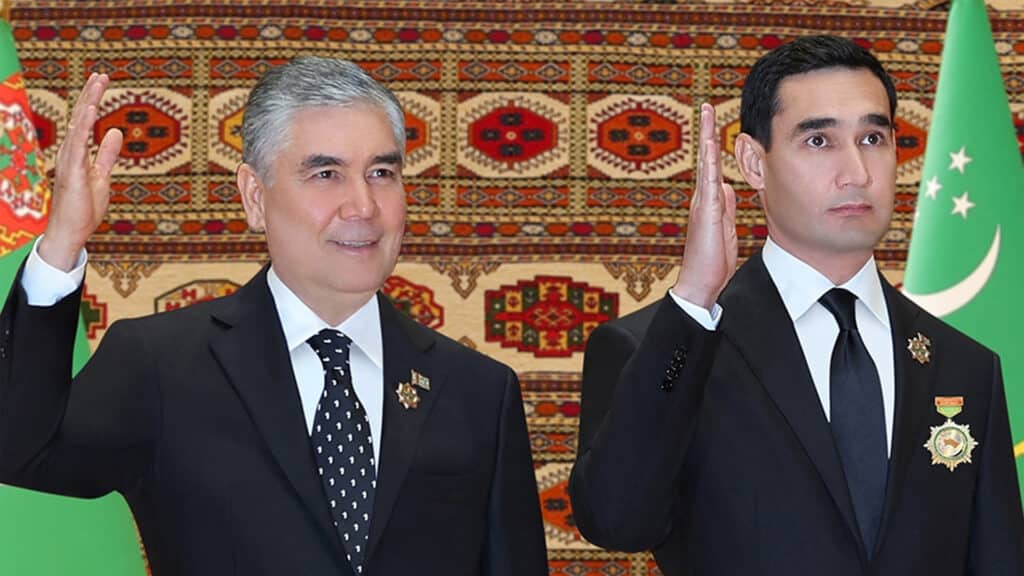Tajikistan is preparing for power transition

Since the beginning of the year, rumors about the long-awaited power transition have been circulating in Tajikistan. This speculation arose after the traditional New Year address was delivered not by current President Emomali Rakhmon but by his eldest son, Rustam Emomali, who holds the position of mayor of Dushanbe, the capital city of this small Central Asian country.
Political scientists interviewed by Kursiv.media believe that although the power transition is inevitable, the number one Tajik family will exercise maximum caution during the process, as in any country, a power transition makes authorities extremely vulnerable.
Why didn’t Rakhmon address the nation on New Year?
According to Temur Umarov, a Tajik political scientist working at the Carnegie Russia Eurasia Center in Berlin, there was nothing unusual about the 2025 New Year address by Rustam Emomali, as the president’s son has done this in the past.
«New Year isn’t the main holiday in Tajikistan. This is probably a sign of a shift away from existing traditions and the formation of a new national identity,» the expert said.
He also noted that similar trends might be observed in other Central Asian countries. For example, President of Kazakhstan Kassym-Jomart Tokayev addresses the nation on New Year from his office, whereas he usually speaks from the parliament during Nauryz (the Spring Equinox and New Year in the ancient Persian calendar). However, Umarov didn’t rule out the possibility that Rakhmon was under the weather on Dec. 31 and chose not to address the nation on that day.
Islam Kurayev, a Kazakhstani political scientist specializing in the Middle East, also believes that the news isn’t worth deep discussions.
«In countries like Tajikistan, it is normal for a president to miss a national address on a holiday. Perhaps Rustam Emomali is on a ‘trial period.’ Anyway, it is quite obvious that Tajikistan has chosen the same pattern as Turkmenistan, where power was transferred from father to son. However, Tajiks aren’t as manageable as Turkmens. The reckless and martial spirit of the people of Pamir (the highlands of Tajikistan) might be a destabilizing factor for the country. This is why all the political processes, like the power transition, will proceed very slowly,» Kurayev underscored.
Duality of power in Tajikistan
Commenting on the dual power structure in the country, Umarov is convinced that the transition of power has already begun. Tajik authorities began preparations for this transition several years ago. In 2021, the constitution of Tajikistan was amended to lower the age requirement for a president from 35 to 30 years. (At that time, Rustam Emomali was under 35.) However, the expert believes that Emomali Rakhmon is still politically active, traveling across the country and representing Tajikistan abroad. Moreover, he continues to act as the referee in various intra-elite conflicts.
«In addition, we are observing an increase in autocracy and control over the public, which means that Rakhmon is preparing Tajikistan for a power transition during which the stability of the regime is most vulnerable. For instance, Rustam Emomali, who will take over political power in the country when his father steps down, is already meeting high-ranking officials in Central Asia and Russia. Moreover, he has met with President Xi Jinping of China and other representatives of Tajikistan’s partners,» Umarov emphasized.
Kurayev also believes that actual dual power is impossible in the country and that the power transition will happen under the total control of Rakhmon.
The cases of Turkmenistan and Azerbaijan
Power transfer from father to son first occurred in Azerbaijan and then in Turkmenistan. The first case has already become a role model for some Central Asian countries, which are also closely monitoring the case of Turkmenistan. According to Umarov, the Tajik president is keeping an eye on both countries, trying to adapt their experiences.
«For many Central Asian countries, Azerbaijan is a role model. Everyone wants to replicate the success of the Aliyev family. Once the power transition in Tajikistan is completed, we will see many parallels with Azerbaijan and Turkmenistan. Of course, there will be some peculiarities because every family and its internal relationships are unique,» Umarov highlighted.

Kurayev agrees that while the processes in Turkmenistan and Tajikistan are distinct, the outcomes are similar.
«In Turkmenistan, the transition process was open and went without major hurdles. On top of that, there is actual dual power in the country. This is why Tajikistan is monitoring the situation and trying to learn from the experience,» the expert added.
What will the power transition look like in Tajikistan?
According to Umarov, there are many parallels between what Turkmenistan has done and what is likely to happen in Tajikistan.
«It’s likely that we will see a Turkmen-style power transition from father to son. During that process, the bureaucracy was a bit confused and did not understand how to behave. As a result, we still observe that Turkmen authorities try to balance the first persona (President of Turkmenistan Serdar Berdimuhamedow) and Arkadag, the national leader (a title for Ex-President Gurbanguly Berdimuhamedow, meaning ‘patron’),» Umarov explained.

According to Kurayev, Emomali Rakhmon isn’t ready to renounce his power, even though his son, Rustam Emomali, has been the second most powerful person in the country for a long time. This suggests, the expert noted, that they do not want to accelerate these crucial political processes. In fact, there is no need to rush since power is already concentrated within the family.
The success of the power transition will depend on Rakhmon’s ability to negotiate and mitigate conflicts.
«The regime in Tajikistan may last quite long as there are no mass protests, divisions within elites, or other issues indicating the weakness of the current authorities. However, there are latent conflicts within the Rakhmon family itself. These conflicts are mitigated as long as Emomali Rakhmon is healthy and active, but what will happen once he steps down? This is the million-dollar question,» Umarov said.
Meanwhile, Tajikistan intends to become fully independent in terms of energy supply by 2027. The country is already a major electricity exporter in Central Asia, supplying power to Uzbekistan, Afghanistan and Pakistan.

